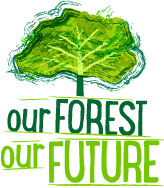How to use this resource...
Our Forest, Our Future helps teachers and pupils to explore the interdependence of people and forests and the vital role forests play in sustaining our environment – in the past, the present and hopefully the future.
The Scots Pine forests in Scotland and the Congo Basin rainforest in Africa provide case studies through which pupils will begin to understand why our forests are under threat and the implications for our planet. Further information about these forests is provided in the following documents.
![]() Teacher info
Scots Pine forest [pdf]
Teacher info
Scots Pine forest [pdf] ![]() Teacher info
Congo Basin rainforest [pdf]
Teacher info
Congo Basin rainforest [pdf]
In making connections between consumerism, people and the environment, pupils will be encouraged to see how they and their actions have an impact on the lives of others globally. It encourages reflection on the possible futures of the world's forests and ways of taking positive actions for a future where people and forests co-exist in a sustainable way.
The resource is structured around a global citizenship framework devised by Oxfam.

More detail on the framework can be found in Global Learning Framework [pdf]
The reflection and evaluation sections in each activity support formative assessment and ongoing monitoring of pupils learning.
Additional assessment opportunities are indicated by... ![]()
Outdoor learning opportunities are indicated by... ![]()
Homework activities are indicated by... ![]()
Taking Action for Change
Education for Global Citizenship is committed to enabling pupils to bring about positive actions for change either locally or globally. This process should support pupils to make their own informed choices through a critical evaluation of the options open to them and the possible implications of those choices.
Throughout the resource there are ideas for possible actions, such as reflecting on our power as consumers, peer education and tree planting. Your pupils themselves should be encouraged to think creatively about the many actions they could take, critically evaluate the impact these actions might have and then evaluate what they have done.
The materials below support your pupils through this process.
